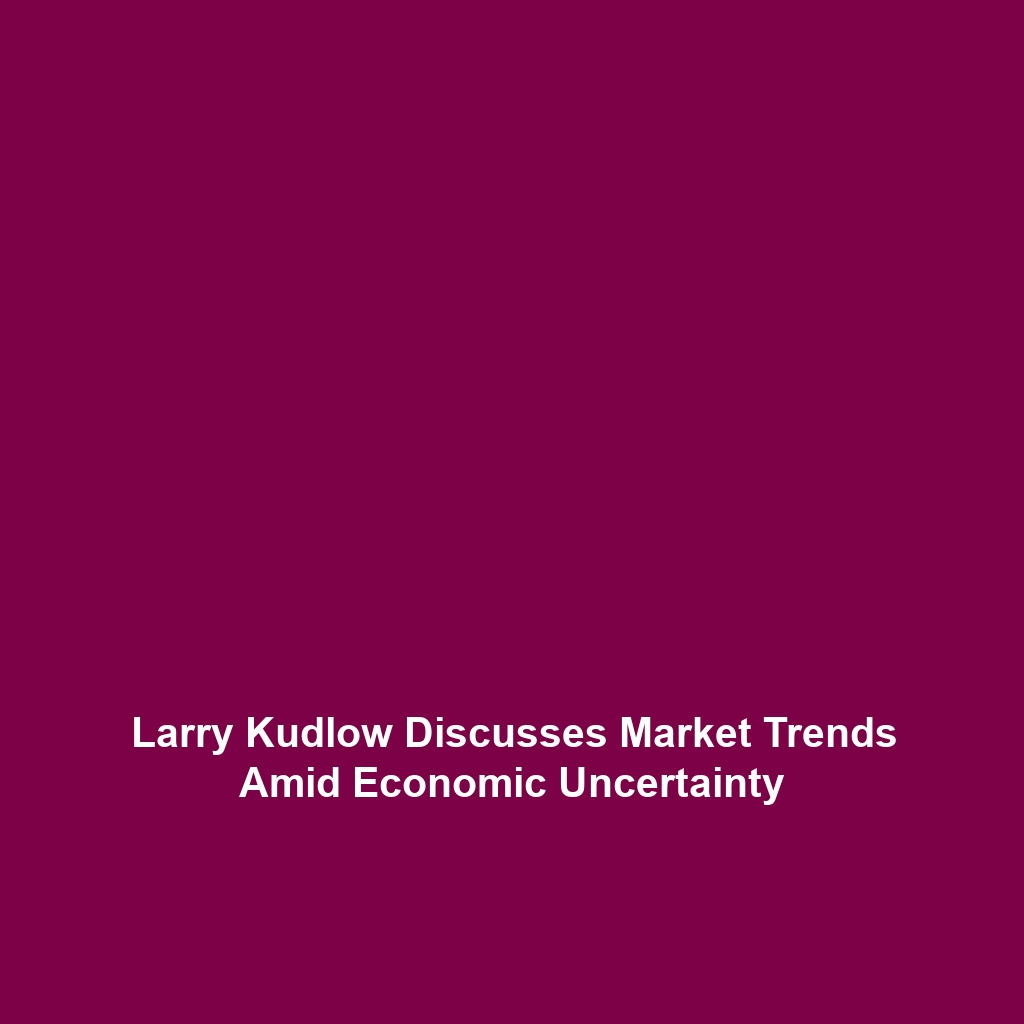Your cart is currently empty!
Tag: job market.

Larry Kudlow Discusses Market Trends Amid Economic Uncertainty
Larry Kudlow Discusses Market Trends Amid Economic Uncertainty
Larry Kudlow Discusses Market Trends Amid Economic Uncertainty
In a recent interview, economist Larry Kudlow provided valuable insights into current market conditions amidst ongoing economic uncertainty. With rising inflation, fluctuating interest rates, and geopolitical tensions influencing economic trends, Kudlow’s perspective serves as a focal point for investors seeking to navigate these turbulent waters.
Current Economic Landscape
The U.S. economy has displayed signs of resilience in the face of multiple challenges, including supply chain disruptions exacerbated by the COVID-19 pandemic and the ongoing war in Ukraine. According to the latest reports from the Bureau of Economic Analysis, the U.S. GDP grew at an annualized rate of 2.4% in the second quarter of 2023, a strong performance relative to expectations. However, Kudlow warns that inflation, which hovered around 3.7% in August 2023, continues to be a significant concern for consumers and policymakers alike.
“Inflation is the number one enemy,” Kudlow stated, emphasizing the need for appropriate measures to stabilize prices. Historical data indicates that inflation rates at or above 3% can erode consumer purchasing power and affect overall economic growth. This volatility creates uncertainty for investors and businesses attempting to forecast their future strategies.
Interest Rates and the Federal Reserve
The Federal Reserve’s current monetary policy has also come under scrutiny as it attempts to balance economic growth with inflation control. Following a series of interest rate hikes in 2022 and 2023, many economists are debating the potential for further increases. Kudlow advocates for a more cautious approach, suggesting that while higher rates are necessary to combat inflation, they should not stifle economic growth. He argues that the Fed needs to be adaptive and flexible in its policy-making.
“The Fed must avoid excessive tightening, which could lead to a recession,” Kudlow cautioned. His remarks reflect broader concerns in the economic community, where some experts predict that continued aggressive interest rate hikes could trigger an economic downturn.
Geopolitical Impacts on Markets
Geopolitical tensions have further complicated the economic landscape. The Russian invasion of Ukraine has led to rising energy prices, which Kudlow notes is one of the contributing factors to inflation. The ongoing conflict has disrupted supply chains, driving up costs for consumers and businesses alike. Kudlow avers that unless geopolitical tensions are resolved, markets will likely continue to experience volatility.
In addition, the U.S.-China relationship remains strained, with trade policies and tariffs shaping market dynamics. Kudlow emphasizes the importance of strong international relations to facilitate trade and economic stability. “We need to ensure our partnerships are robust to mitigate risks,” he stated, underscoring the interconnectedness of the global economy.
Investment Strategies for Volatile Times
In light of these challenges, Kudlow offers strategic advice for investors. His primary recommendation is diversification. He believes that a well-diversified portfolio can reduce risk during periods of high market volatility. Investors should consider a mix of asset classes, including stocks, bonds, and alternative investments, to better position themselves against economic shocks.
Kudlow also highlighted the significance of sectoral investments. Sectors such as technology and renewable energy are likely to witness growth, while traditional sectors may face headwinds. He notes, “Investors should focus on innovation and adapt to changing market trends.” This sentiment is echoed by several analysts who argue that companies embracing technology will outperform their peers.
Looking Ahead: Future Growth Prospects
Despite the current economic challenges, Kudlow remains optimistic about the potential for future growth. He points to robust consumer spending and a resilient job market as indicators of a strong economy. The unemployment rate, which is currently at 3.5%, suggests that job security remains a critical strength in the U.S. economy.
“If we can maintain consumer confidence and reduce inflation, I believe we can see sustained economic growth,” Kudlow asserted. He encourages policymakers to prioritize growth-oriented strategies that will support businesses and foster an environment conducive to innovation.
Conclusion
As markets grapple with a unique set of challenges, Larry Kudlow’s analysis provides a valuable lens through which to understand current trends. His insights on inflation, Federal Reserve policies, geopolitical factors, and investment strategies offer a roadmap for navigating economic uncertainty. While the path ahead may be fraught with obstacles, Kudlow’s perspective underscores the importance of adaptability and foresight in achieving long-term economic stability.
For investors and policymakers alike, engaging with these trends and adjusting strategies accordingly will be crucial in the coming months. As Kudlow aptly noted, “The key to success lies in understanding the complexities of the market and preparing for whatever lies ahead.”